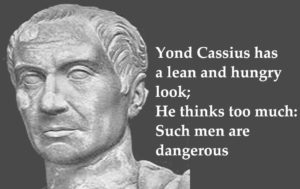 “Let me have men about me that are fat;
“Let me have men about me that are fat;
Sleek-headed men and such as sleep o’ nights:
Yond Cassius has a lean and hungry look;
He thinks too much: such men are dangerous.”
(Julius Caesar, act 1, sc. 2)
Comments and Tips for Use. Use the last two lines to cast a friendly and ironic remark on a colleague, ‘Yond (name of colleague) has a lean and hungry look. He thinks too much, these men are dangerous.”
More in general, the problem outlined by Caesar extends through history, from his times onward – seemingly a paradox considering the advancements of science and that authorities officially promote learning. A paradox easily resolved, however,if the ‘thought’ referred to in Shakespeare’s topic lines is confined to ‘political thought’.
That political thinking may be a threat to the status-quo finds palpable evidence in specific cases. Since reading and writing promote thought, at one time they had to be prevented, for example, among African slaves.
Fearing that black literacy would prove a threat to the slave system, whites in the Deep South passed laws forbidding slaves to learn to write and making it a crime for others to teach them. For instance, in 1740 South Carolina passed the following legislation: “Whereas, the having slaves taught to write, or suffering them to be employed in writing, may be attended with great inconveniences; Be it enacted, that all and every person and persons whatsoever, who shall hereafter teach or cause any slave or slaves to be taught to write, or shall use or employ any slave as a scribe, in any manner of writing whatsoever, hereafter taught to write, every such person or persons shall, for every such offense, forfeit the sum of one hundred pounds, current money.”
Things have changed but, at its root, the “great inconveniences” remain. For sure, people must think, read and write to have and hold almost any job. Solution? Instead of preventing education manufacture consent, to quote Noam Chomsky’s popular phrase, via massive indoctrination by the corporate media and other means.
For a thorough description consult his book, but the technique involves, to begin with, distraction. That is, “Maintaining public attention diverted away from the real social problems, captivated by matters of no real importance. Keep the public busy, busy, busy, no time to think, back to farm and other animals.”
Then treat the public as a little child, use the emotional side more than inviting reflection and, of course, keep the public in ignorance and mediocrity, “The quality of education given to the lower social classes must be as poor and mediocre as possible so that the gap of ignorance it plans among the lower classes and upper classes is and remains impossible to attain for the lower classes.”…etc.
To conclude, Julius Caesar was right, citizens who think too much are dangerous to dictators, rulers and power elites.
All entries on this site are derived from the book “Your Daily Shakespeare”. It contains 1390 pages identifying over 10,000 daily situations. Each situation directs you to one or more Shakespearean repartees, comments, and answers. Repartees, comments, and answers that will get you on the stage or at least out of the water – besides making you a regular winner of verbal contests. “Your Daily Shakespeare” has been described as the most unusual, useful and unique book of Shakespearean quotations. Nothing similar exists or has ever existed.
If you like this website why not subscribe (see last menu item to the right)? You will get automatically any new blog as well as any other information and novelty that will be forthcoming, including a system to effortlessly (yes) remember hundreds of Shakespearean quotes by heart while having fun in the process. You can also chat with me – please go to the chat-page. And I promise, no sales calls, trade leads, venomous schemes, hidden plots, Machiavellian conspiracies, commercial ploys, psychological tricks, leads exchanges, barter proposals, suggestions or offers of any kind imaginable (and unimaginable).
In the play. Caesar expresses to Antony his reservations about Cassius.
